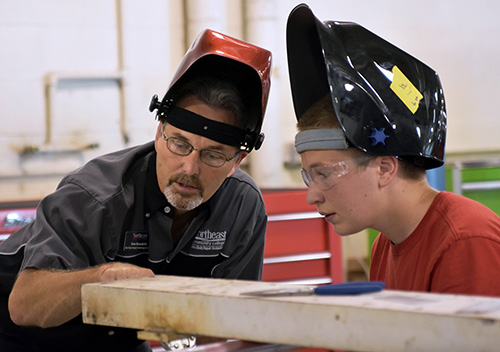NORFOLK, Neb. – The Board of Governors at Northeast Community College has approved a plan to offer free dual enrollment classes to high school students enrolled in early college beginning in the 2023-24 academic year.
Dual enrollment includes dual credit courses, which are most often taken in area high schools and taught by instructors who meet Northeast’s qualifications outlined by the College’s accrediting body, the Higher Learning Commission (HLC). (HLC is the accrediting body for all public institutions in the state of Nebraska and establishes the required credentials for all instructors teaching college level courses.)
Additionally, dual enrollment courses include high school students who choose to take a college-level course, not necessarily for high school credit. More and more students are choosing to take college-level classes online, virtually and at any Northeast location. In Fall 2022, 48 high schools in the 20-county service area offered Northeast dual credit classes at their locations with 1,867 students enrolled in early college.
In Spring 2021, the Nebraska Legislature began to provide funds directed to support dual enrollment offered by the state’s six community colleges. In Spring 2022, the Unicameral then provided the community colleges with $15 million in American Rescue Plan Act (ARPA) funds to accelerate their efforts to offer free dual enrollment. Metro Community College led the way by offering free college courses to all high school students beginning in Fall 2022. Likewise, the ARPA funds will allow Northeast to make free dual enrollment a reality in Fall 2023.
“Experiencing success in college level work for high school students can be the catalyst for choosing to attend college,” said Dr. Leah Barrett, Northeast president. “Eighty-six percent of the students in our service area who are successful with an early college class go on to college. Dual enrollment is a tool for us to improve the college-going culture in northeast Nebraska.”
Dr. Jami Jo Thompson, superintendent of Norfolk Public Schools, said early college courses have always been a great opportunity for students to earn college credit during high school, but many of the district’s families could not afford to take advantage of the opportunity.
“Making dual credit courses free is a game changer for those students! I am looking forward to seeing the positive impact that this will have on our lower-income students, and I anticipate that it will lead to a higher number of those students choosing to attend post-secondary education,” she said.
Makala Williams, director of early college at Northeast, said the College offers many different subjects as dual credit classes, including academic transfer, as well as career and technical education (CTE) courses.
“Many of our area high schools have their own instructors who have obtained the appropriate credentials to teach college level courses in addition to high school courses. This gives high school students a wonderful opportunity to earn both high school and college credit simultaneously. Students can work with their school counselors to learn what dual credit courses are offered in their respective schools.”
Williams said the credits students earn through the early college program may be used towards a degree at Northeast or transfer to another college or university.
“It allows students to become familiar with the college environment before their first day as a college freshman.”
Additional ways credits may be earned is through the College’s Fridays @ Northeast program and Pathways to Tomorrow (P2T). The Fridays program allows high school seniors to spend the final day of the school week on a Northeast campus in CTE classrooms and labs that meet college program requirements.
The P2T consortium offers CTE classes that are facilitated through Educational Service Unit (ESU) #2 and includes eight-member schools: Bancroft-Rosalie, Emerson-Hubbard, Guardian Angels Central Catholic (West Point), Howells-Dodge, Lyons Decatur Northeast, Oakland-Craig, Pender, and West Point-Beemer. Classes are held at the Northeast Community College extended campus and Donald E. Nielsen Career and Technical Education Center in West Point.
“Free dual enrollment classes for early college students ensures equitable access to the students and families we serve,” said Gina Holtz, P2T executive director and director of Northeast’s extended campus in West Point. “The change to free dual enrollment classes will impact over one-hundred students at Pathways 2 Tomorrow. P2T students can get a jump start on their college or career goals without financial barriers with this opportunity. I am excited to see our early college program grow through the success of our students.”
“South Sioux City Community Schools is thrilled with the news of free dual credit courses for our high school students. This unique opportunity will open doors for our students that didn't previously exist,” said Ashley O’Dell, assistant superintendent.
O’Dell said all 3,800 students South Sioux City Public Schools’ serve will be positively impacted by Northeast’s action.
“South Sioux City Community Schools has prioritized college and career readiness and Northeast Community College has been a vital partner in our endeavors. We look forward to continuing to expand this partnership to meet the needs of our students and our community.”
While early college at Northeast Community College will be at no cost to high school students, they will be responsible for any books, tools or fees associated with a course.
To learn more about early college at Northeast Community College, visit northeast.edu/Admissions/Early-College or contact Williams at (402) 844-7118 or makalaw@northeast.edu.
--###--
PHOTO CUTLINE
Dave Beaudette, autobody repair technology instructor at Northeast Community College, works with a high school student enrolled in the College’s Friday’s @ Northeast program. On Thursday, the Northeast Board of Governors approved a plan to offer free dual enrollment classes for high school students enrolled in the institution’s Early College program beginning in the 2023-24 academic year.

